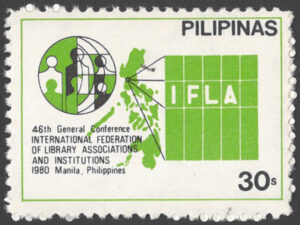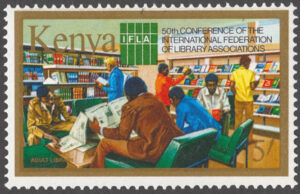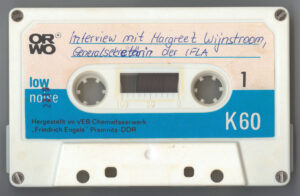Engaging with IFLA’s past, preparing for the future
27 February 2025
What were the forces that shaped IFLA’s evolution over the years? What countries first joined the federation? How has membership in IFLA changed? Did IFLA always have strategic goals? How did we measure or conceive of engagement in the past? Seeking out answers to questions like these leads to additional questions that stretch back to the beginning of the 20th century.

As IFLA makes way for its centenary in 2027, it is useful to think about how and why we began and evolved over the decades; 100 years is a long time for any organisation, public or private.
As we look forward to another century of “advancing the interests” of our stakeholders, we invite you to explore how we’ve managed to stay relevant and engaged throughout the years—and to understand how many of today’s initiatives and successes are firmly rooted in our years of voluntarism, outreach, partnership, advocacy and continuous evolution.
Engagement, expressed in the past through phrases such as “international cooperation”, “multilateralism”, “intellectual cooperation”, “consultative arrangements”, and “international understanding”, was clearly on the rise during the 1970s and 1980s. In many ways, these decades gave birth to contemporary IFLA, but it couldn’t have happened without the decade that preceded it, nor without what came even earlier.

The results were, however, were unambiguous: the 1970s to 1980s saw rapid growth and development in our membership, volunteer base, conference model, and overall geographic representation. All in all, it was an incremental but breathtaking leap that was years in the making.
Understanding these decades of change is now in closer reach, as IFLA Headquarters and partners are making long out-of-print and primary source material publicly available in the IFLA Repository.
IFLA History from the archives

Until recently it’s been difficult for the non-specialist to look at, let alone accurately gauge, IFLA’s work before the digital age without some serious investment in research time and travel.
As we look towards our 100th, we’re making it possible for anyone with an internet connection to engage with our past in new ways. Looking back helps us to position ourselves for possible futures and for this we’ve made some tools and resources visible, and even audible.
By drawing attention to inflection points in the arc of our history, we can gain a better understanding of how we’ve shaped, and been shaped by, the LIS profession in all its permutations, libraries’ physical and digital landscapes, as well as how our advocacy work has fueled advancement through partnership and engagement. This collection aims to provide new entry points into IFLA’s past.
Over 140 items have already been added to this collection, with many more to come. Highlights include:
- Edinburgh Resolution: a proposal for the establishment of an International Library & Bibliographical Committee [1927]
- Statutes, 1929-2024
- Annual Reports, 1928-1999; made publicly available via HathiTrust—all soon to be in the IFLA Repository:
- Actes du Conseil (1928-1968)
- IFLA Annual (1969-1975)
- IFLA Annual (1976-1995)
- IFLA Council Report 1995-1997
- IFLA Council Report 1997-1999
- Strategic planning (AKA Long and Medium Term Progamme), 1963-2001
- Photographs
- Letter from U.S. President Barack Obama
- Bibliography of Conference papers, seminars, workshops, etc., 1968-1992
- History of Sections (various)
- Audio recordings (speeches, interviews)
- IFLA Day: Boston, 21 August 2001 (Proclamation)
- ‘The Welcome’, a poem written by Edwin Morgan for IFLA’s 75th anniversary
- 50th Anniversary exhibit in Brussels (slides)
- Commemorative stamps:
- 1977 (Brussels)
- 1980 (Manila)
- 1984 (Nairobi)
- 1986 (Tokyo)
- 1996 (China)
- 2009 (Milan)
Questions about this collection or IFLA’s archives? Contact [email protected].